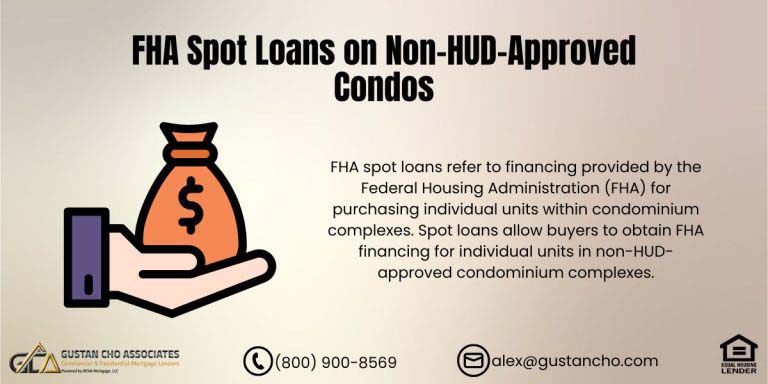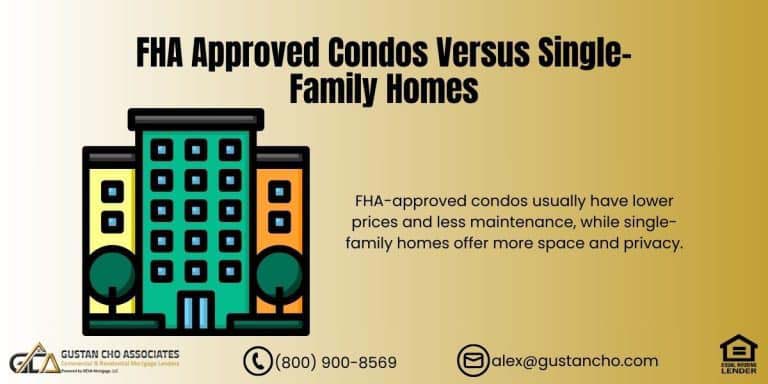This guide covers limited review versus full review condo purchase. Due to the real estate and mortgage meltdown of 2008 and the historical number of foreclosures throughout the country, new FHA, Fannie Mae, and Freddie Mac mortgage guidelines have been implemented on condominium unit purchases. There are limited review versus full review condo purchase rules and regulations for condo unit borrowers. Dale Elenteny, a senior mortgage loan originator at Gustan Cho Associates says the following about limited review versus full review condo purchase:
Condo loans are much tougher than single-family home mortgage loans. Not only do borrowers need to be qualified and pre-approved but also the condominium complex.
But if the condominium project does not meet FHA, VA, Fannie Mae, and/or Freddie Mac guidelines, they cannot get their condominium financing. They may get a portfolio lender to approve their condominium purchase loan. In the following paragraphs, we will cover limited review versus full review condo purchase guidelines.
How Do Lenders View Condos versus Single-Family Homes
All condominium lenders consider condo mortgage loans very risky. Their mortgage lending standards are much more strict than single-family homes. Bruce Manning, an associate contributing editor at Great Community Authority Forums says the following about limited review versus full review condo purchase:
The condo project needs to be approved and meet FHA, VA, Fannie Mae, and/or Freddie Mac mortgage lending guidelines. Condo buyers can have 800 plus credit scores, have strong job stability, very low debt to income ratios, and ample reserves.
Due to the many hurdles involved with condominium financing, many condominium unit sellers have only allowed cash-only buyers to see their condo units. In this article, we will discuss and cover limited review versus full review on condominium purchase guidelines.
Limited vs. Full Condo Review — Know the Difference
Understand how each review type impacts your approval, down payment, and closing time.
Limited Review versus Full Review Condo Purchase Guidelines on FHA Loans
Borrowers approved for FHA Loans and cannot qualify for a conventional loan, choices in shopping for the right condo unit may be limited. HUD, the parent of FHA, will only finance FHA approved condos. HUD now approves FHA spot loans on a case-by-case scenario.
More and more condominium complexes who were FHA approved are not renewing their HUD certification status due to the high renewal costs.
Borrowers only approved for FHA loans need to make sure that realtor not only checks with HUD-approved condominium list. But also to contact the condo project’s condo association and make sure that the condo project is HUD-approved. HUD is the parent of FHA.
Fannie Mae And Freddie Mac Condo Lending Guidelines
For a condo unit to be eligible for conventional financing, mortgage lenders need to make sure that the condominium complex qualifies Fannie Mae and/or Freddie Mac lending guidelines. This because ultimately these two mortgage giants will buy the condo loans originated and funded by condo mortgage lenders. Lenders need to go through a review process. It involves the condo homeowners association financial review.
Appraisal of the subject condo complex and condo unit is required in order to make a determination if the condo complex and unit meets the eligibility requirements for financing.
There are two types of reviews that need to be done. Either a full review of the condominium and its financial needs to be performed or a limited review of the subject property. If a condo buyer puts the minimum 5% down payment on a condo purchase and has less than perfect credit and lower reserves, a full review of the condominium project may most likely be required. Minimum down payment for a second home condo loan is 10% down payment. Minimum down payment for an investment condo loan is 15% down payment.
Full Review on Condo Purchase
The criteria for a full review is that the condominium needs to have 51% or more of its units be an owner occupant. This means it needs to be a warrantable condominium unit. No single person or entity can own more than 10% of the condominium units. Maximum commercial space in the condominium project cannot be more than 20% on mixed-used condominium projects. Dale Elenteny says the following about limited review versus full review condo purchase:
Litigation is extremely frowned upon and a condominium project with major pending litigation will most not likely be approved.
If there are litigation due to defects in construction and/or structural issues, the condominium project will definitely not be approved. Full financials and declarations of the condominium association will need to be provided to the mortgage lender. Mortgage lenders will want to see line items for cash reserves with a minimum of 10% of assessments and income being collected by condo unit owners. Mortgage lenders do not want to see any more than 15% of the condo homeowners association dues delinquent for more than 30 days.
Renting a Condominium Unit
Condo unit rentals cannot be advertised as daily rentals like a hotel or motel. For rentals, it needs to be a minimum of 3-day rentals. There must be sufficient insurance coverage with regards to the following:
- hazard insurance.
- flood insurance.
- liability insurance.
- coverage of the individual condo unit owner, HO6.
Buying a Condo? Don’t Skip This Step
Whether you need a limited or full review can make or break your deal.
Benefits of Limited Review versus Full Review Condo Purchase
The difference between the limited review versus full review condo purchase is with a full review, the full condo docs consisting of compliance is required:
- By laws of the condominium associations.
- Restrictions on the right to sell or rights of first refusal.
- Any amendments to the original condominium documents.
- Legal rights of guarantors.
- Rights of first mortgagees.
- Any unpaid fees and dues need to be provided.
Anyone purchasing a condo unit that is less than 400 square feet will be required to have the mortgage lender do a full review. Cut through the confusion. Compare limited review and full review condo guidelines, find out which is faster, and nail the approval for your next investment property.
Limited Review Versus Full Review Condo Purchase Guidelines
Limited Review Versus Full Review Condo Purchase is the way to go for condominium unit buyers. Difference between limited review versus full review condo purchase is a full review can take time and can be costly. John Strange, a senior mortgage loan originator at Gustan Cho Associates says the following about limited review versus full review condo purchase:
If the condo mortgage underwriter finds any flaws in the condo association’s financials and/or if there are litigation issues, borrowers can get denied.
The difference between the limited review versus full review condo purchase, is to pass a limited review, the condo complex cannot have any more than 10% of the units owned by any one individual and/or entity. If the condo complex is a multi-unit condo project, no more than 20% can consist of commercial space. No structural and/or construction defects can be active, present.
Condo Purchase Guides: Full Review vs. Limited Review
What Is a Full Review?
A full review is an in-depth audit lenders perform when you buy a condo. They want to confirm that the condo community meets all the rules for getting a mortgage. Full reviews usually kick in for brand-new buildings, property that has just been converted into a condo, or any project with previous problems, like lawsuits or shaky finances. Fannie Mae, Freddie Mac, and other agencies want lenders to check a long list of items.
They want to see the condo association budget, what types of insurance the project carries, all the legal papers, how many owners are behind on dues, and what the owner-occupancy rate is—generally, that rate has to be over 51% for the condo to be classified as warrantable.
Lenders also look at how many units a single investor can own, making sure no one person has too many, and they check for active lawsuits that could hurt the project’s future. Because the condo association must provide so much paperwork, this review can take longer and may delay the closing date.
What is Limited Review for Condo Buying?
A limited review is a fast-track option for buying condos, perfect for projects that are older and whose risks lenders see as lower. With this process, you won’t need as much paperwork. John Strange, a senior mortgage loan originator at Gustan Cho Associates says the following about a limited review:
The lender checks a few key items: is the unit part of a recognized condo building, has the down payment hit the required level—usually 10% for primary homes and more for investment properties—and is the borrower eligible.
Lenders can skip a deep dive into the Homeowners Association’s budget, rules, and more, speeding things up and cutting fees. Condos that go through a limited review get the thumbs-up far more often than those that need a full review, so this can be a smart choice for buyers who want a smoother, faster loan experience.
Key Differences Between Limited and Full Review Condo Purchase Guidelines
Limited and full review condo purchase guidelines differ in how much they dig into the project, what they ask for, and when they are used. Full reviews require a deep dive into the condo project, looking at its finances, and they set hard limits—such as no more than 15% of the units being behind on condo fees.
Limited reviews kick in for lower-risk condos, like older projects with condo and townhouse units, and they skip many of the detailed checks if the loan hits certain safe spots, like a big down payment.
Full reviews are the go-to for brand-new condos or those with red flags. In contrast, limited reviews speed things up. However, they are not open to every project, especially if investors own many units or the building has just switched to condos. Buyers must remember that full reviews tell lenders the project is rock solid, while limited reviews trade that certainty for a quicker, easier process.
Pros and Cons of Limited Review When Buying a Condo
Choosing a limited review for a condo purchase brings clear perks like quicker loan approvals and lower costs since there are fewer HOA docs to collect. This method works especially well for buyers looking at older, stable complexes where the chances of getting approved are very high, reducing the odds of a last-minute denial. Still, there are trade-offs. Limited reviews don’t suit every project, particularly those showing warning signs that need a deeper dive. Skipping the full review could mean missing red flags in the condo association, which might lead to unexpected bills.
Speed Up Your Condo Closing
A limited review could mean less paperwork and faster approval — find out if you qualify.
Advantages and Drawbacks of a Full Review for Condo Buying
A full review digs into every corner of the condo project, protecting buyers and lenders by confirming the development can stand the test of time.
This level of scrutiny is crucial for non-warrantable condos or those with special traits, checking everything from insurance to reserve funds and lawsuits.
The downside is the stack of paperwork, bigger fees, and a timeline that drags on, which can stall closings and test buyers’ patience on tight schedules. Even with these hurdles, full reviews are sometimes the only way to finance tricky projects, making them a must for those wanting a wider range of loan options.
When to Use a Limited Review Instead of a Full Review
Suppose you’re buying a condo in a well-established, low-risk project and putting down a strong down payment. In that case, a limited review can help you close faster and with less paperwork.
This option works great for a main home or a vacation place in a project that has held up over time, passes the main Fannie Mae guidelines, and shows no clear problems.
When the community has many owner-occupied units and no recent red flags, choosing limited review can shave off processing time and costs while giving you access to a conventional loan.
When to Lean on a Full Review for Condos
Choose a full review for brand-new condo buildings, projects that converted in the past few years, or any development with red flags like late condo fees or ongoing lawsuits. This option is also necessary for investment units or if the project doesn’t clear the limited review items. This process’s deeper dive catches hidden issues and ensures the whole complex is solid enough for a long-term loan. In these cases, the extra attention protects you. It opens the door to getting a mortgage that a limited review might deny.
Simple Steps for Managing Condo Purchase Reviews
When you buy a condo, knowing the difference between a limited and full review is key. Start by checking with your lender immediately to see what type you need. Packers like the budget, insurance, and ownership ratio for a full review, while a limited review looks at just the basics for good-standing projects.
Collect the HOA papers early to spot any red flags. If the condo isn’t on the warrantable list, expect extra paperwork. A real estate agent who knows condo financing can keep you on track.
Brace for longer timelines with full reviews, and match your choice to your schedule and how much risk you can take for a smooth purchase.
Frequently Asked Questions: Limited Review versus Full Review Condo Purchase
What’s The Key Difference Between Limited Review versus Full Review Condo Purchase Guidelines?
Limited review is faster and is for stable projects with low risk. A full review digs deeper into the budget, insurance, and ownership for newer, riskier, or larger projects.
Can I Use a Limited Review For Any Condo Mortgage?
No. Limited review is for tied units in stable projects with a down payment that meets lender rules. If the condo doesn’t meet those, a full review is needed.
How Does the Timing of Full Review Stack Up Against Limited Review?
Full reviews are detailed and can stretch out across multiple weeks because of the paperwork involved. In contrast, limited reviews are much speedier, usually finishing up in just a few days. That speed can make limited reviews the go-to choice when a quick closing is the goal.
Are Condos Under Limited Review Approved at Higher Rates?
Absolutely. Condominiums qualifying for limited review are often more likely to win approval. That’s because the limited review checklist is shorter and less demanding.
Do I Need a Full Review For Condos Bought as Investments?
Not necessarily. Investment condos still qualify for limited review if they hit the right benchmarks, like a certain down payment or owner-occupancy ratio. If they don’t, the full review becomes mandatory.
Types of Condominium Mortgage Loans
The individual condo unit needs to be at least 400 square feet or larger. Not more than 15% of the condo homeowners association dues can be delinquent for 30 days or more. The condominium homeowners association cannot allow its condominium owners to do daily rentals like a hotel and/or motel and cannot be advertised as such. For condominium unit owners wanting to rent, they need to have a 3-day rental minimum.
Difference between limited review versus full review condo purchase is to be eligible for limited review for a condominium buyer, they need to put a minimum of 10% down payment for an owner occupant home, and 25% down payment for a second home financing.
Condo mortgage lenders may require a larger down payment for an owner occupant condominium unit buyer depending on circumstances. Investment condominium units do not qualify for limited review and need to go through a full review. For more information about limited review versus full review condo purchase guidelines, contact us at Gustan Cho Associates at alex@gustancho.com or call us at 800-900-8569. Text us for a faster response. The team at Gustan Cho Associates is available seven days a week, evenings, weekends, and holidays.
Avoid Surprises in Your Condo Purchase
We break down limited versus full review so you can budget and plan with confidence.










Hello, my name is Eric McDonald. I am a 100% disabled veteran trying to purchase a home. My credit is below the 580s, but I have been attempting to rebuild and continuous on-time payments. I want the opportunity to buy a house in the 78418 area. I read so of your companies reviews, and now you handle VA individuals and would like you to “work your magic” with my family and me. Attached below is my certificate of eligibility.